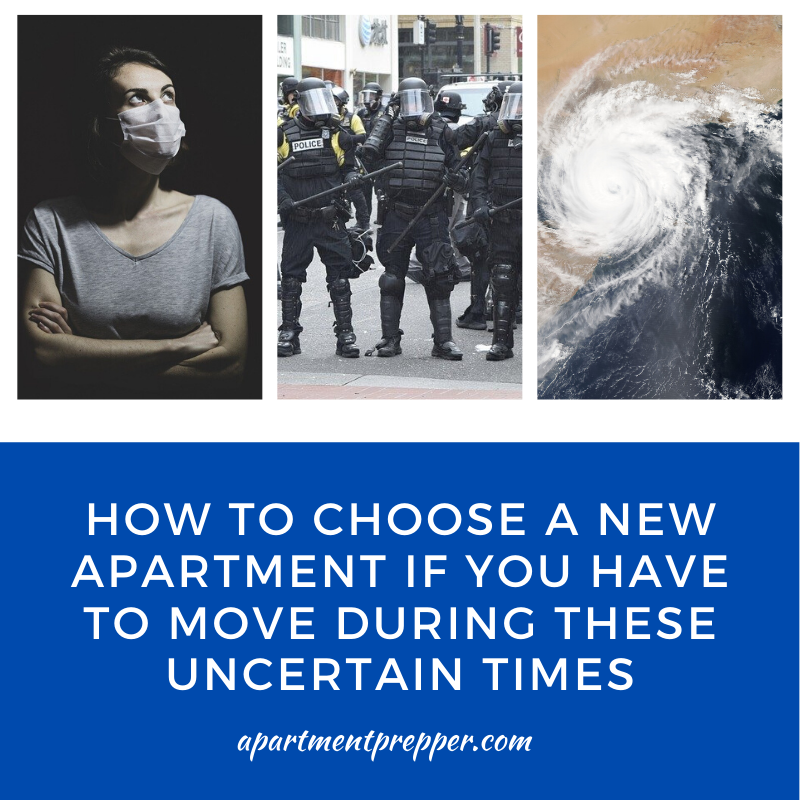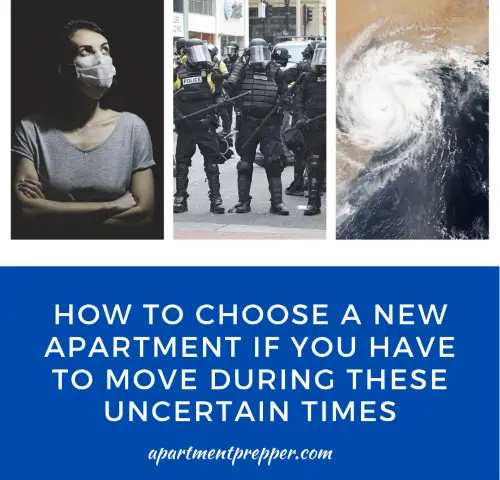This post is by Bernie Carr, apartmentprepper.com
This year has certainly had a lot of challenges. Many states are just coming out of the coronavirus lockdown, and now riots and civil unrest have spread across the country. I have received emails from readers who are wondering if they should move.
Is this a good time to move?
Everyone’s situation is different. Some renters may found their rent is too high, given their job situation. Many businesses have closed and people are unable to find jobs right away. Or, you may find that staying in lockdown for several months and witnessing some alarming events around you have highlighted or worsened problems with your apartment. Though there are extra challenges to moving, people are still finding new places to live.
Evaluate your goals
What are the reasons you want or need to move? Are you looking for lower rent? Are you unhappy with the way your officials handled the pandemic? Have you found your area to be unsafe? How far do you want to move? Once you have determined your goals, you will want to narrow the choices and investigate potential areas.
Check the crime statistics
Because safety is a huge issue in many areas, you’ll want to check specific neighborhoods in your chosen areas. I always check crime statistics in any area I am considering by visiting sites such as neighborhoodscout.com
You can also check out Facebook groups of people that live in certain neighborhoods to see what type of things happen day to day.
The commute
Many employees are working from home during the coronavirus pandemic. When offices start to reopen, you may have to start driving to work again. Find out how long the commute will be during rush hour. If you check GoogleMaps, it may show a fast commute right now, but may be different when traffic starts building up again. Add 15 to 30 minutes if you are checking during a time of light traffic.
Check the school district
If you have children, you should also check the rankings of the school district in areas you are considering.
What type of disasters are common in the area?
Another thing you should be aware of is the type of perils and disasters that tend to hit the area. For example, many suburbs in Houston are said to be in a 100 year flood zone. Leasing managers and real estate agents might mention it but gloss over it dismissively, since “nothing ever happens.” Well, when Hurricane Harvey hit a couple of years ago, those 100 year flood zones did get severely flooded forcing many residents to evacuate and find new places to live very quickly.
Drive around the area
Finally, don’t just choose the apartment – view the area as well. Some apartments are beautiful and appear safe, but can be in an area that is an oasis. It’s safe in the immediate vicinity, but go a few blocks and you hear gunfire at night.
Observe the people in the apartment and around the district. Are they social distancing? Wearing masks? Are you getting the feeling your family will be safe here?
Is the apartment close to services such as grocery stores, hospitals, fire department?
Drive around so you know where the good and bad areas are. Be aware of your surroundings at all times.
Talk to the tenants
I like to chat with the employees at the leasing office, or strike up a conversation with tenants I encounter. You can usually find out if there are long term residents and what they like and don’t like about the
Check the reviews
Before choosing an apartment, search for reviews online. I once had my eye on a new apartment building in my area. The apartment looked great, and had reasonable rents. When I checked the reviews online, I found out the building had a terrible pest problem. Many renters were so frustrated that they were venting online about the management’s lack of solutions to the pest problems.
Weigh the pros and cons
As with any decision, ultimately, you will need to weigh the good and the bad. Maybe the rent is affordable, but the area is not great. Is it worth the risk? I always choose the area for safety. You can’t be home all the time and you need peace of mind that you and your family will be safe.
*******************************************************************
We are an affiliate of Amazon.com, which means we received a small commission if you click through one of our Amazon links when you shop, at totally no cost to you. This helps keep the lights on at the blog. Thanks!
About the author:
Bernie Carr is the founder of Apartment Prepper. She has written several books including the best-selling Prepper’s Pocket Guide, Jake and Miller’s Big Adventure, The Penny-Pinching Prepper and How to Prepare for Most Emergencies on a $50 a Month Budget. Her work appears in sites such as the Allstate Blog and Clark.com, as well as print magazines such as Backwoods Survival Guide and Prepper Survival Guide. She has been featured in national publications such as Fox Business and Popular Mechanics. Learn more about Bernie here.


